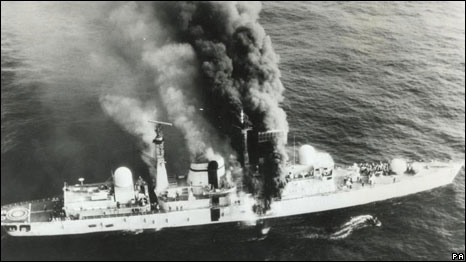Protecting Shipwrecks 保护沉船遗址
Protecting Shipwrecks 保护沉船遗址
By Sam Wilson, BBC News

The wreck of British warship HMS Sheffield, sunk in 1982, is protected under British law
媒体英语会带大家一起学习 BBC 撰稿人在报道世界大事时常用到的单词和短语。
Background: 十年前联合国科教文组织(UNESCO)通过法案保护100年前的深海沉船。现存问题是是否应该保护那些历史少于100年,而且有人不幸丧生的船只残骸。
收听与下载
Polish authorities recently banned divers from coming within 500 metres of the Wilhelm Gustloff. The German ship was sunk by a Soviet submarine in the Baltic Sea in 1945. More than 9,000 lives are thought to have been lost - the single largest death toll at sea.
Last month, seven European naval associations condemned Dutch salvage firms which they said were desecrating sailors' graves. They'd been searching for scrap metal aboard three British warships torpedoed and sunk off the Netherlands in 1914.
UNESCO's Convention on the Protection of Underwater Cultural Heritage, which was adopted ten years ago, does not apply in these cases, because it only protects shipwrecks more than 100 years old.
Whether ships and their dead should be left to rest in peace, or are sites of legitimate archaeological interest, can be a vexed and often emotional question.
Archaeologists say their job is the recovery and meticulous preservation of priceless artefacts. Many of them reject the label "treasure hunters".
But, with deep-sea exploration equipment costing tens of thousands of dollars a day, they need to cover their costs somehow. It's no surprise, then, that a ship laden with gold, silver and other valuables is seen as the greatest prize.
Glossary 词汇表 (收听发音, 请单击英语单词)
- death toll死亡人数
- to condemn谴责
- to desecrate亵渎;污辱
- scrap metal废金属
- to adopt采纳,采用
- legitimate合法的
- vexed有争论的
- meticulous小心仔细的
- to cover their costs拿回成本
- laden with装满了